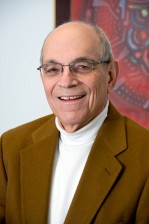
From Pain to Progress: One Man's Journey to Fund Cancer Research
-
More than a decade after his wife’s death, Lowell Dubrow is still fighting cancer by funding research at Fox Chase.

“One of the things about cancer is that there are a lot of people touched by it—almost everyone is—and those stories kind of get to you,” says Lowell Dubrow, a longtime Fox Chase donor. If anyone can speak on the subject, it’s Dubrow, whose family has a cancer story filled with more twists, turns, and coincidences than most.
The casually dressed probate lawyer is sitting at his desk in the fifth-floor office that he shares with his son and law practice partner, Barry, in Jenkintown. Three miles down the road, at Fox Chase Cancer Center, scientists are taking MRIs of mice and placing slides under microscopes in a laboratory that is dedicated to unraveling the biological workings of ovarian cancer. Their work is funded by Dubrow, who decided to support Fox Chase in honor of his wife, Roberta, who first came to the Center for treatment in 1995 and eventually succumbed to the disease in 1997.
Quest for the Best
When Dubrow brought Roberta to Fox Chase, it was because her ovarian cancer had recurred, and he didn’t want to mess around. He wanted the best. After he got in touch with a friend at the National Institutes of Health, it became clear to Dubrow that Fox Chase was the place to go in the Philadelphia region for ovarian cancer care.
After an initial consultation at Fox Chase, they went for a second opinion at Memorial Sloan-Kettering, another esteemed cancer center in New York City.
“They told me they wouldn’t do anything different from what the Fox Chase doctors were proposing,” Dubrow says. So, Fox Chase it was.
A Commitment to Research
Although Roberta’s condition was quite advanced, Fox Chase physicians were able to extend her life for another year and a half. As her treatment continued, however, Dubrow made a disappointing observation: “She tended to respond to the chemotherapy of the moment, but the responses were short-lived. Unfortunately, we seemed to be running through therapies faster than they were being discovered.”
This observation sparked what would become a passionate dedication to supporting cancer research. Almost immediately after Roberta died in June 1997, Dubrow contacted Fox Chase to initiate a fund in her name. What began as a way for Dubrow to cope with Roberta’s passing has transformed into a major, long-lasting fundraising effort on behalf of the Center.
“I mentioned to law firm colleagues that I would appreciate contributions to the fund and I did a pretty good job of raising money in the month or two after Roberta’s death,” Dubrow says, but the fund’s balance belies his modesty. To date, the Roberta P. Dubrow Endowed Research Fund, which currently supports the laboratory of ovarian cancer researcher Denise Connolly, PhD, has raised nearly $225,000.
Friends in the Right Places
Much of the fund’s support has come from Dubrow’s friend Eli Caplan, who manages a family foundation.
“He honors me by allowing a portion of the foundation to support organizations that are close to me,” Dubrow says.
The Dubrow family’s experiences with cancer are not limited to Roberta’s struggle. Dubrow’s brother and father both died of bladder cancer at the same age—69—and his current partner, Margie, is being treated for the same disease that overtook his wife—ovarian cancer.
Still, the family’s history of cancer has a silver lining: Now that cancer prevention and genetic testing have become common practice, Dubrow’s children and Margie’s children can use the knowledge of their family history to be proactive about their cancer risk.
The Plot Thickens
A year after his wife’s death, Dubrow was surprised by a call from Fox Chase. In light of discoveries about gene mutations, they had tested a sample of Roberta’s tissue—stored in Fox Chase’s vast tissue repository—and found that she had been a carrier of an abnormal BRCA gene. Mutations in this gene, which can be inherited by a carrier’s children, greatly increase breast and ovarian cancer risk.
Dubrow implored his children to be tested for the abnormal gene and found out that one of them carries it. This means that more cancer may be in their future—a fact that has deepened Dubrow’s commitment to supporting research.
“One can learn a lot from genes,” he says. “If my wife had known she had [an abnormal BRCA gene], she’d probably be alive today.”
Turning Lows into Highs
Reflecting on his encounters with the disease, Dubrow sees positives and negatives: “I’ve had a little too much experience with cancer, but I’m not sorry about my associations with Fox Chase.”
In addition to the satisfaction of knowing that his fundraising efforts are supporting an important cause, Dubrow looks back and knows that Roberta was treated at a highly compassionate facility.
“Because Fox Chase is exclusively a cancer hospital, they know the people going there are really sick,” he says. “I’ve always found that the staff at Fox Chase understands that—that they need to be even more caring than they would be to a population that is healthier.”
Evaluating his history of charity to Fox Chase, Dubrow says, “I like that I do these things. I feel good about it, and I have a couple friends who support me.”
This concise assessment could be chalked up to Dubrow’s characteristic modesty—or the fact that giving, to him, seems natural.
“If you help people, shouldn’t you be deriving pleasure from that?” he asks. “When I visit Fox Chase and see things happening that couldn’t have been done without my gifts and the gifts of others, I really enjoy it.”
Learn the many ways that you can support cancer research at Fox Chase Cancer Center.
